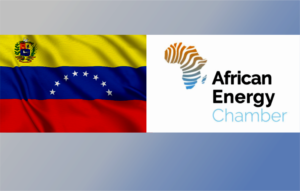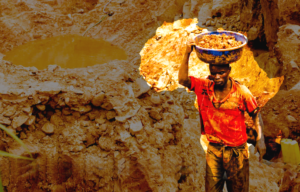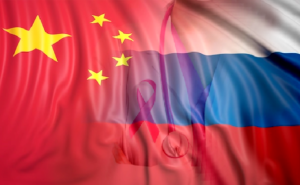Hemedti Dagolo – Africa’s Most Dangerous Warlord, fueling Sudan’s Blood, Gold, Power and the Collapse of a Nation
When Khartoum awoke in April 2023 to the sound of tanks rolling through its streets and jets screaming overhead, it was the return of a nightmare Sudan had never truly escaped. The gunfire wasn’t just a clash of uniforms; it was the unraveling of a state, a showdown between the army of General Abdel Fattah al-Burhan and the paramilitary empire of Mohamed Hamdan Dagalo – known simply as Hemedti.
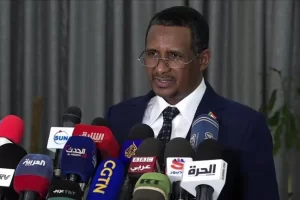
To many, Hemedti embodies the paradox of African leadership in crisis. Once a camel trader in Darfur, he built his fortune not through ballots or policy, but through blood and gold. His militia, the Rapid Support Forces (RSF), grew out of the Janjaweed, the feared “devils on horseback” who in the early 2000s carried out massacres in Darfur that the United States called genocide.
Darfur’s story began with drought, land, and identity — clashes between Arab nomads and African farmers. But by the 1980s, these tensions were weaponized by Libya’s Muammar Gaddafi, who armed Arab tribes in pursuit of a grand project of Arab supremacy across the Sahel. Local skirmishes became racialized wars. The Sudanese state, weak and opportunistic, co-opted these militias rather than stopping them.
By 2003, when Darfur’s non-Arab communities rose up for equality, Khartoum unleashed the Janjaweed. Villages were torched, women raped, men executed, and entire communities erased. The United Nations estimates some 300,000 people were killed. Survivors still carry the scars of genocide.
Hemedti rose in this crucible. By the mid-2000s, he was no longer a mere foot soldier but a commander who understood both the battlefield and the marketplace. With loyalty to Omar al-Bashir’s regime, he transformed his militia into a formal force, the RSF. Bashir gave him weapons and rank; in return, Hemedti gave the dictator a tool sharper than the army itself.
What made Hemedti different was his grasp of economics. In 2017, his RSF seized Darfur’s Jebel Amir gold mines, ousting his former mentor Musa Hilal. That single act turned a warlord into one of Sudan’s richest men. Through his family company, Al Junaid, Hemedti turned Sudan’s gold wealth into a private treasury, smuggling billions’ worth to Dubai and beyond.
For ordinary families in Darfur, this gold never meant schools, hospitals, or food security. It meant deeper poverty, as their land was militarized and their sons recruited into militias. Gold became a curse, financing wars abroad in Yemen and Libya, where Hemedti rented his fighters to Gulf monarchies. His deals extended even to Russia’s Wagner Group, trading Sudan’s resources for weapons and political backing.
This was more than smuggling; it was the creation of a “global war corporation,” one that blurred the line between state authority and private wealth.
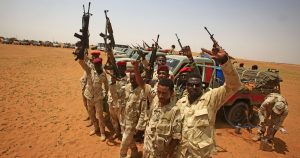
By the time al-Bashir fell in 2019, toppled by mass protests, Hemedti was too powerful to ignore. He reinvented himself as a “man of the people” while his RSF massacred over 100 protesters in Khartoum in June 2019. Internationally, he shook hands with Gulf leaders and flew to Moscow. Domestically, he secured the position of deputy chairman of Sudan’s Sovereignty Council and effectively the country’s second-in-command.
But Sudan’s fragile transitional government, meant to shepherd the country toward democracy, was always overshadowed by the rivalry between Hemedti and al-Burhan, the army chief. Their uneasy alliance collapsed in 2023 when plans to merge the RSF into the national army broke down. The April fighting in Khartoum was not just a coup gone wrong, it was a duel for Sudan’s soul.
As war raged in the capital, Darfur once again became the epicenter of atrocity. Reports emerged of RSF fighters and allied Arab militias targeting the Masalit people with mass killings, executions and sexual violence, a chilling echo of the genocide that happened two decades earlier. Families fled once more into displacement camps, caught in a cycle of trauma that African leadership has too often failed to break.
The conflict has displaced millions, destabilized borders, and risks plunging the wider Sahel into deeper insecurity. It raises pressing questions: What does leadership mean in a country where state institutions collapse, and militias become governments unto themselves? What happens when natural resources like land, water, gold are turned into weapons instead of wealth for families?
Sudan’s war is not an isolated tragedy. It mirrors broader dilemmas on the continent, from the resource wars in Congo to oil-fueled insurgencies in Nigeria. It reveals how the failure to balance justice, governance, and inclusion can transform local disputes into wars of extermination.
In the concerned views of African leaders, Sudan is both a warning and a test. It emphasizes the need for leadership that protects communities rather than exploiting them, that treats resources as a path to collective survival, not personal empires. And for the global community, it is a reminder that indifference to early warnings like drought, displacement, ethnic tensions, can eventually cost hundreds of thousands of lives.
Sudan today is a battlefield. But it is also a mirror, reflecting the consequences of power pursued without humanity. In the shadow of Hemedti’s rise, African leadership faces a choice: to repeat the mistakes of warlordism and exclusion, or to forge strategies that protect both land and people, ensuring families are not forever trapped in the crossfire of greed and guns.
Mohamed Hamdan Dagalo, widely known as Hemedti and who he is and why he carries such a reputation:
Early Life & Rise
- Born around 1975 in Darfur, Sudan, to a Chadian Arab family from the Rizeigat tribe.
- Started as a camel herder and trader, but became involved in local conflicts as militias formed during the Darfur War in the early 2000s.
- Gained influence under Sudan’s longtime dictator Omar al-Bashir, who armed and relied on Arab militias (known as the Janjaweed) to crush uprisings in Darfur.
Janjaweed & War Crimes
- Hemedti rose as a Janjaweed commander, accused of mass killings, rape, and ethnic cleansing in Darfur.
- Later, Bashir formalized these militias into the Rapid Support Forces (RSF) and put Hemedti in charge.
- Human rights groups and the International Criminal Court (ICC) have linked his forces to atrocities including:
- Massacres of civilians in Darfur.
- The Khartoum massacre of 2019, where over 100 peaceful protesters were killed and bodies dumped in the Nile.
- Looting, torture, and scorched-earth campaigns in Sudan’s peripheries.
Political Power
- After Bashir’s fall in 2019, Hemedti became Deputy Chairman of Sudan’s Sovereign Council (the transitional government).
- Built immense wealth by controlling Sudan’s gold mines and establishing business ties with Russia’s Wagner Group, Gulf monarchies, and Egypt.
- His RSF became almost a state within a state — well-funded, heavily armed, and loyal to him personally rather than Sudan’s military.
Sudan Civil War (2023–present)
- In April 2023, tensions between Hemedti’s RSF and General Abdel Fattah al-Burhan’s Sudanese Armed Forces (SAF) erupted into full-scale war.
- The conflict has devastated Sudan, with reports of ethnic cleansing in Darfur, mass displacement, and urban warfare in Khartoum.
- Hemedti portrays himself as a reformer and even claims to support democracy, but his forces are accused of atrocities, executions, and mass sexual violence.
Why He’s called “Africa’s Most Dangerous Warlord”
- Controls a private army estimated at 70,000–100,000 fighters, better equipped than Sudan’s regular army in some areas.
- Holds vast gold wealth, making him one of Africa’s richest warlords.
- Has regional influence, with allies and arms deals spanning Russia, the UAE, and Chad.
- His forces’ brutality and impunity have destabilized Sudan and risk spilling conflict across Africa’s Sahel region.


